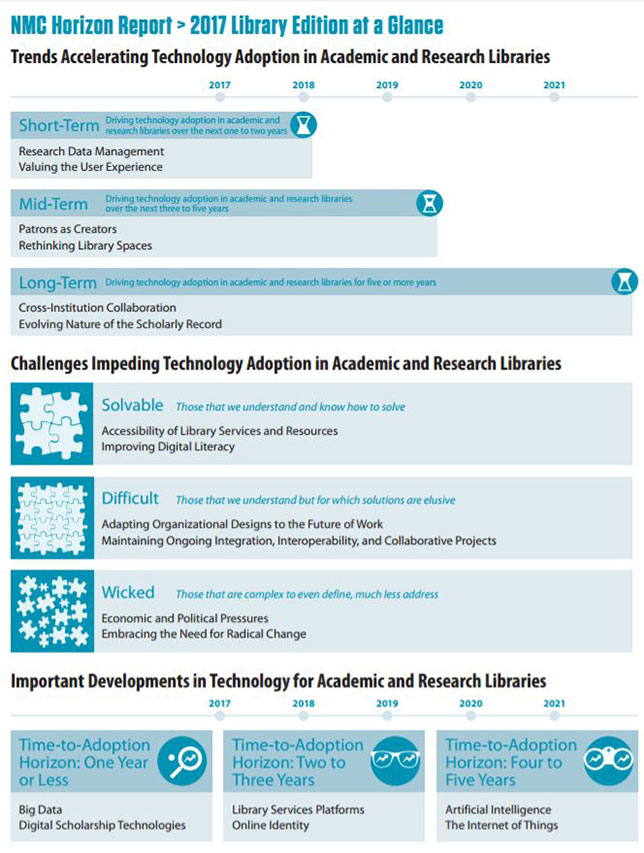Ed Tech Forecast
Report: AI and IoT to Change Academic and Research Libraries in Years to Come
- By Dian Schaffhauser
- 04/05/17
In the next year or two, research data management and the valuing of the user experience will drive technology adoption in research and academic libraries. The growth of research reports through online library databases is making it easier for students, faculty and researchers to access and build upon existing ideas and work. But as libraries adopt new data formats, they must also prepare for new methods of data curation involving "cutting-edge technology." Libraries are also tapping usability principles in their digital and physical spaces to improve the quality of patrons' interactions by making them more efficient and personalized.
These two trends are among the six identified in the latest "NMC Horizon Report > 2017 Library Edition." The third such report for university libraries also describes six "significant challenges" and six "important developments in educational technology," that will influence information management globally in the near-term, mid-term and far future.

The report was a joint project of the New Media Consortium, the University of Applied Sciences Chur and ETH Library in Switzerland, Technische Informationsbibliothek in Germany and the U.S.-based Association of College & Research Libraries. Topics were selected by a panel of 75 experts, including librarians, technologists and industry leaders from 14 countries. Participants held a three-month virtual discussion to share how the trends were materializing in their own environments.
In the mid-term, over the next three to five years, the report stated that libraries would be influenced by the movement of patrons as creators and a rethinking of library spaces. The first identifies a shift taking place among users from being primarily content consumers to being content makers, and they look to libraries as "creation hubs" where they'll find tools for making and for building their skills. For similar reasons, library leaders are re-examining the design of library spaces as places "to be productive" and to better facilitate collaboration.
In the long-term — five years and beyond — libraries will see more cross-institution collaboration to improve access to scholarly materials and promote cooperative projects. Also, the "scholarly record" will continue evolving to incorporate not just text products, but also research data sets, visualizations, interactive mash-ups and web-based exchanges through social media.
The challenges that are "impeding technology adoption" in libraries are classified as "solvable," "difficult" and "wicked." Among the wicked obstacles are economic and political pressures that are challenging the fundamental principles of intellectual freedom as well as the problems inherent in embracing "radical change."
The difficult challenges are twofold: 1) the need for libraries to adopt more flexible, team-based and matrix-structures to address the new needs of the campus community; and 2) building capacity to stay up with projects that require integration, interoperability and collaboration to generate funding.
The problems viewed as more solvable are improving the accessibility of digital library services and resources to ensure equal opportunity and improving the digital literacy of patrons.
The panel of experts also explored the developments taking place in library technologies. Over the next year, big data and digital scholarship technologies will have a firm home in libraries. In the next two to three years, library automation platforms and online identity will come to the forefront. And over the next four to five years libraries are also expected to adopt artificial intelligence to better personalize services and to use the Internet of Things to optimize energy use and track library resources.
The report includes examples for each of the trends taken from academic and research libraries. It also documents "semi-finalists," topics that were under consideration by the experts but didn't make the final cut.
"It is our hope that this analysis will help to inform the choices that academic and research libraries are making to improve, support or extend learning and research," the report's authors noted in its executive summary.
The "NMC Horizon Report > 2017 Library Edition" is published under a Creative Commons license and is available on the NMC Horizon website here.
About the Author
Dian Schaffhauser is a former senior contributing editor for 1105 Media's education publications THE Journal, Campus Technology and Spaces4Learning.

